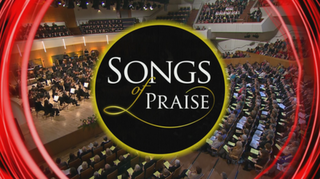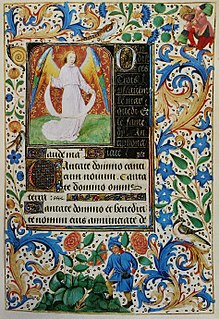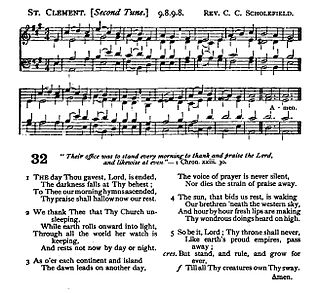Related Research Articles

Contemporary worship music (CWM), also known as praise and worship music, is a defined genre of Christian music used in contemporary worship. It has developed over the past 60 years and is stylistically similar to pop music. The songs are frequently referred to as "praise songs" or "worship songs" and are typically led by a "worship band" or "praise team", with either a guitarist or pianist leading. It has become a common genre of music sung in many churches, particularly in charismatic or non-denominational Protestant churches with some Roman Catholic congregations incorporating it into their mass as well.
"I Vow to Thee, My Country" is a British patriotic hymn, created in 1921, when music by Gustav Holst had a poem by Sir Cecil Spring Rice set to it. The music originated as a wordless melody, which Holst later named "Thaxted", taken from the "Jupiter" movement of Holst's 1917 suite The Planets.

"Be Thou My Vision" is a traditional Christian hymn of Irish origin. The words are based on a Middle Irish poem that has traditionally been attributed to Dallán Forgaill.

Songs of Praise is a BBC Television religious programme that presents Christian hymns sung in churches of varying denominations from around the UK.

"Abide with Me" is a Christian hymn by Scottish Anglican Henry Francis Lyte. A prayer for God to stay with the speaker throughout life and in death, it was written by Lyte in 1847 as he was dying from tuberculosis. It is most often sung to the tune "Eventide" by William Henry Monk.

"Carmen Ohio" is the oldest school song still used by Ohio State University. The song was composed by freshman athlete and Men's Glee Club member Fred Cornell in 1902 or 1903. According to some accounts, he composed it on the train ride home from Ann Arbor, Michigan after Ohio State suffered an 86-0 loss to the Michigan Wolverines. The song was set to the tune of "Spanish Hymn", or "Spanish Chant", and the Men's Glee Club first performed it in 1903; however, it did not gain popularity until after its publication in The Lantern on October 10, 1906. At the following Ohio State-Michigan football game on October 20, 1906, "Carmen Ohio" was published in the program. In 1915, Cornell recalled that he wrote the song in 1903 at the request of the Men's Glee Club, and other family members later stated that the train story might be an exaggeration or outright fabrication. Currently, after every home football game in Ohio Stadium, win or lose, the football team and the crowd sing the first verse of Carmen Ohio, accompanied by The Ohio State University Marching Band. It is also sung by new graduates at the end of the university's commencement ceremonies, after diplomas are distributed.

"Dear Lord and Father of Mankind" is a hymn with words taken from a longer poem, "The Brewing of Soma" by American Quaker poet John Greenleaf Whittier. The adaptation was made by Garrett Horder in his 1884 Congregational Hymns.

Psalm 95 is the 95th psalm of the Book of Psalms, beginning in English in the King James Version: "O come, let us sing unto the LORD: let us make a joyful noise to the rock of our salvation.". The Book of Psalms starts the third section of the Hebrew Bible, and, as such, is a book of the Christian Old Testament. In the slightly different numbering system in the Greek Septuagint version of the Bible, and in the Latin Vulgate, this psalm is Psalm 94. In Latin, it is known as "Venite exultemus". The psalm is a hymn psalm, one of the Royal psalms, praising God as the King of His people. Psalm 95 identifies no author, but Hebrews 4:7 attributes it to David. The Vulgate also names David as the author.

"Lord of all Hopefulness" is a Christian hymn written by English writer Jan Struther, which was published in the enlarged edition of Songs of Praise in 1931. The hymn is used in liturgy, at weddings and at the beginning of funeral services, and is one of the most popular hymns in the United Kingdom.
A Elbereth Gilthoniel is an Elvish hymn to Varda (Elbereth) in J. R. R. Tolkien's The Lord of the Rings. It is written in Sindarin, and not translated in the main text where it is first presented.
"Tell Out, My Soul" is a Christian hymn paraphrasing the Magnificat, which was written by Timothy Dudley-Smith in 1962. It is popularly sung to the hymn tune Woodlands composed by Walter Greatorex in 1916.
"Shine, Jesus, Shine" is a Christian praise song written in 1987 by Graham Kendrick.
"Here I Am, Lord", also known as "I, the Lord of Sea and Sky" after its opening line, is a Christian hymn written by the American composer of Catholic liturgical music Dan Schutte in 1979 and published in 1981. Its words are based on Isaiah 6:8 and 1 Samuel 3:4. It is published by OCP Publications.

Julian Keith Getty OBE is a Northern Irish Christian singer and songwriter, best known for writing the modern hymn "In Christ Alone" in 2001 with veteran English songwriter and worship leader Stuart Townend. Getty and his wife also release music under the musical duo Keith & Kristyn Getty, which have been nominated for many Dove Awards, and have albums that have charted on multiple Billboard charts.

Kristyn Elizabeth Rebekah Getty is a Northern-Irish singer, songwriter, recording artist, worship leader and voice actress. With her husband, Keith Getty, she has co-written many award-winning songs and hymns which have charted on multiple Billboard charts and been nominated for various awards. Her unique vocal sound has led to duets with artists including Vince Gill, Alison Krauss, Heather Headley, Chris Tomlin, Trip Lee, Michael W Smith, Moya Brennan, Ricky Skaggs and Ladysmith Black Mambazo.

Psalm 96 is the 96th psalm of the Book of Psalms, a hymn. The first verse of the psalm calls to praise in singing, in English in the King James Version: "O sing a new song unto the Lord". Similar to Psalm 98 and Psalm 149, the psalm calls to praise God in music and dance, because he has chosen his people and helped them to victory. It is one of the royal psalms praising God as the King of His people. In the slightly different numbering system used by the Greek Septuagint and the Latin Vulgate, this psalm is Psalm 95.
Be Still may refer to:

The day thou gavest, Lord, is ended is a Christian hymn written by the Anglican hymnodist the Rev John Ellerton (1826–1893) in 1870 for its inclusion in A Liturgy for Missionary Meetings. It is often sung to the tune of St Clement and its theme focusses on the worldwide fellowship of the church and its continual offering of prayer and praise to God.
"Nun lob, mein Seel, den Herren" is a Lutheran hymn written in German by the theologian and reformer Johann Gramann in 1525. It was published in 1540 and appears in 47 hymnals. A translation by Catherine Winkworth, "My Soul, now Praise thy Maker!", was published in 1863.
References
- ↑ Benner, Steve (2004). "Be still, for the presence of the Lord". Oremus Hymnal. Archived from the original on 14 February 2015. Retrieved 30 June 2014.
- ↑ Reeves, Marjorie; Worsley, Jenyth (2001). Favourite Hymns: 2000 Years of Magnificat. A&C Black. p. 197. ISBN 9780826477231.
- ↑ Albert, Samuel. "Be Still For The Presence of The Lord Lyrics and Story Author: David J Evans".
- ↑ "BBC One - Songs of Praise, Beverley Minster, be still, for the presence of the Lord".
- ↑ "World War One hymn is nation's favourite". BBC. 29 September 2019.